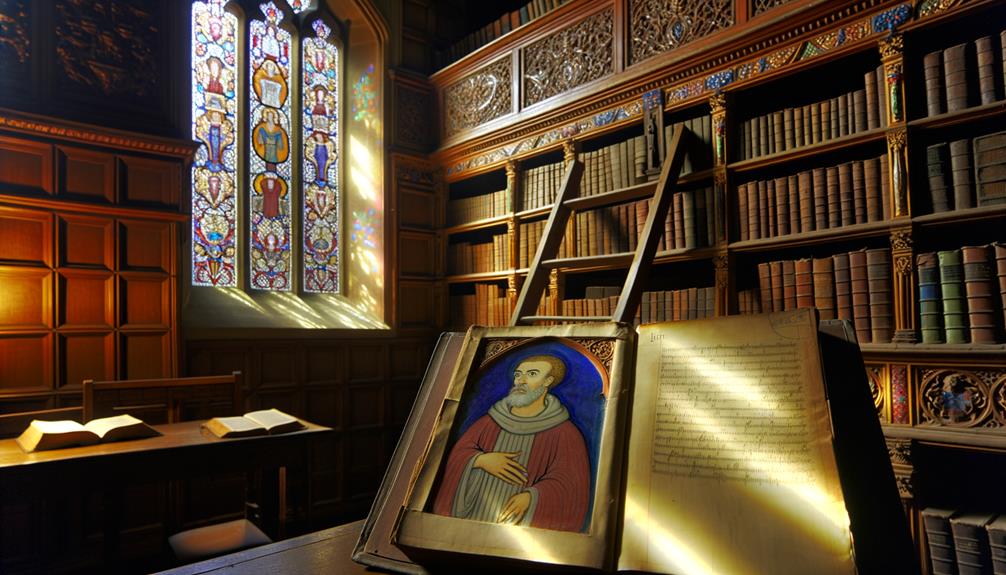Meaning of Augustine in the Bible: Grace and Wisdom
Augustine of Hippo, though not explicitly mentioned in the Bible, profoundly influenced Christian thought through his theological contributions. His doctrines on original sin and grace versus free will reshaped the understanding of human nature and divine salvation.
Augustine’s rigorous scriptural exegesis emphasized both literal and allegorical interpretations, unifying the Old and New Scriptures to foster a deeper love for God and neighbor. His intellectual and spiritual legacy continues to shape contemporary Christian doctrine and theological debate.
To explore the nuances of his influence and the depth of his theological insights, much awaits to be discovered.

Meaning of Augustine in the Bible: Name Origin and Christian Significance
| Aspect | Details |
|---|---|
| Name | Augustine |
| Meaning | Majestic, venerable, or great (Latin origin from Augustus) |
| Biblical Reference | Not found in the Bible |
| Historical Significance | Linked to Saint Augustine of Hippo, a major Christian theologian |
| Spiritual Symbolism | Represents wisdom, transformation, and devotion to God |
| Faith Insight | Though not biblical, the name is associated with deep theological insight and Christian legacy |
Augustine’s Early Life

Born on November 13, 354, in the Roman province of Numidia, Augustine’s early life was marked by a profound intellectual curiosity and a complex relationship with his religious upbringing. His mother, Monica, was a devout Christian, while his father, Patricius, adhered to pagan traditions.
This dichotomy deeply influenced Augustine, inculcating in him a lifelong tension between secular ambitions and spiritual pursuits.
Educated in rhetoric and philosophy in Carthage, he was drawn to Manichaeism, a dualistic religion that promised rational answers to existential questions.
Despite his intellectual achievements, Augustine’s early years were also characterized by moral struggles and existential doubts, reflecting a mind in relentless search for truth and meaning amidst the prevailing cultural and religious milieu of late antiquity.
Conversion and Calling

Augustine’s profound transformation from a seeker of worldly pleasures to an ardent Christian theologian underscores a pivotal moment in his existential journey, marked by an intense internal struggle and eventual spiritual awakening.
This metamorphosis is poignantly chronicled in his autobiographical work, ‘Confessions,’ where he recounts the torment of his dual desires: the lure of temporal indulgences versus the call of divine grace.
Influenced by the prayers of his devout mother, Monica, and the persuasive teachings of Bishop Ambrose, Augustine’s conversion culminates in a moment of epiphany in a Milanese garden.
Hearing a child’s voice urging him to ‘take up and read,’ he fortuitously opens the Scriptures, leading to a profound internal shift and irrevocable commitment to Christian discipleship.
Key Theological Contributions

Augustine’s theological contributions, particularly his doctrines of Original Sin and the interplay between grace and free will, have had a profound impact on Christian thought.
His articulation of Original Sin underscores humanity’s inherent need for divine intervention, while his exploration of grace and free will addresses the complexities of human agency in the context of salvation.
These foundational ideas not only influenced the development of Western Christianity but also set the stage for subsequent theological debates and doctrines.
Original Sin Doctrine
As one of Augustine’s most profound theological contributions, the doctrine of original sin fundamentally redefined the Christian understanding of human nature and its inherent moral deficiencies.
Augustine posited that humanity inherited sin from Adam, resulting in a natural predisposition toward sinfulness.
This concept had several key implications:
- Human Depravity: Augustine argued that original sin corrupts every facet of human nature, rendering individuals wholly incapable of achieving righteousness through their own efforts.
- Baptismal Necessity: He emphasized that baptism is essential to cleanse individuals from original sin, marking a critical sacramental practice in Christianity.
- Transmission of Sin: Augustine proposed that original sin is transmitted through human procreation, thereby affecting all descendants of Adam.
These tenets collectively reshaped theological discourse, emphasizing the need for divine intervention in human salvation.
Grace and Free Will
A cornerstone of Augustine’s theological legacy is his intricate exploration of the interplay between divine grace and human free will, a discourse that has profoundly influenced Christian soteriology.
Augustine posited that human nature, marred by original sin, is incapable of achieving salvation without divine grace. He argued that grace is not merely assistance but a transformative gift that enables true freedom.
This divine initiative does not negate human free will but rather empowers it, allowing individuals to choose good and seek God.
Augustine’s synthesis of these concepts challenged Pelagianism, which emphasized human effort, and laid the groundwork for subsequent theological developments, asserting that grace precedes and sustains any meritorious act of will.
This nuanced view remains central to Christian theological dialogue.
Scriptural Interpretations

Augustine’s Biblical exegesis is marked by a profound engagement with both the literal and allegorical dimensions of Scripture, offering a nuanced interpretative framework.
His approaches reveal an intricate balance between faith and reason, emphasizing the importance of theological insights drawn from a meticulous study of biblical texts.
Augustine’s Biblical Exegesis
Interpreting the Bible through the lens of Augustine’s theological framework reveals a profound synthesis of faith and reason, underscoring his commitment to harmonizing scriptural truths with philosophical inquiry.
Augustine’s exegesis is characterized by several distinctive features:
- Allegorical Interpretation: Augustine often interpreted biblical narratives allegorically to uncover deeper spiritual meanings, bridging the gap between the literal text and its theological significance.
- Christocentric Focus: His readings consistently pointed to Christ as the central figure, interpreting Old scriptures and events as prefigurations of Christ’s life and mission.
- Moral and Doctrinal Insights: Augustine extracted ethical and doctrinal teachings from scripture, emphasizing their application to Christian life and practice.
These elements highlight Augustine’s intricate approach to scriptural exegesis, blending intellectual rigor with devout spirituality.
Interpretative Approaches
Delving into the interpretative approaches of scriptural interpretations, it becomes evident that Augustine’s methods were both multifaceted and deeply rooted in his theological convictions.
Augustine employed a hermeneutical framework that balanced literal and allegorical readings of the Bible, arguing that scripture should be interpreted in a manner that reveals its deeper spiritual truths.
He emphasized the importance of context, historical background, and the unity of the scriptures, asserting that the Old and New Scriptures should be read as a cohesive whole.
Augustine’s interpretative approach also involved a moral dimension, where the ultimate aim of scriptural interpretation was to foster love for God and neighbor, encapsulating his belief in the transformative power of divine revelation.
Theological Insights
In examining the theological insights within Augustine’s scriptural interpretations, one must recognize his profound belief in the interconnectedness of faith and reason as essential tools for understanding divine revelation.
Augustine’s approach is characterized by several key elements that provide a deeper comprehension of Biblical texts:
- Allegorical Interpretation: Augustine frequently employed allegory to uncover spiritual meanings beneath literal scriptural narratives, thereby elucidating deeper divine truths.
- Original Sin and Grace: His interpretation of Genesis greatly shaped the doctrine of original sin, emphasizing humanity’s need for divine grace.
- Christocentric Focus: Augustine’s hermeneutics consistently centered on Christ, interpreting Old Testament prophecies and events as prefigurations of Christ’s life and mission.
These elements collectively highlight Augustine’s enduring contribution to theological scholarship.
Influence on Christian Doctrine

Augustine’s theological contributions profoundly shaped the development of Christian doctrine, particularly through his writings on original sin, grace, and the nature of the Church.
His concept of original sin posited that all humanity inherits Adam’s sin, necessitating divine grace for salvation. Augustine’s discourse on grace emphasized its irresistible nature, essential for overcoming human depravity and attaining redemption.
Furthermore, he articulated a vision of the Church as a divine institution, critical for dispensing grace through sacraments. These doctrinal positions greatly influenced Western Christianity, particularly within Catholicism and Reformed traditions.
Augustine’s rigorous intellectual approach provided a theological framework that addressed heresies and solidified key tenets, thereby shaping ecclesiastical teachings and doctrinal orthodoxy for centuries.
Augustine’s Enduring Legacy

Reverberating through the annals of Christian history, Augustine’s theological insights have left an indelible mark on both ecclesiastical thought and broader intellectual traditions.
His contributions continue to shape theological discourse, ethical considerations, and philosophical inquiries.
Augustine’s enduring legacy can be encapsulated in key areas:
- Doctrine of Original Sin: Augustine’s articulation of humanity’s inherent sinfulness profoundly influenced Western Christianity’s understanding of human nature and divine grace.
- City of God: This seminal work provided a framework for Christian thought concerning the relationship between the sacred and secular domains.
- Augustinianism: His ideas led to the development of a theological tradition that continues to inform contemporary Christian debates on predestination, free will, and salvation.
These elements underscore Augustine’s lasting influence on Christian theology and philosophy.
Conclusion
Augustine’s journey, akin to a ship steering through turbulent seas, ultimately anchored in the tranquil harbor of divine wisdom.
Through his theological contributions and scriptural interpretations, Augustine shaped the contours of Christian doctrine, leaving an indelible mark on the theological landscape.
His legacy, much like an ever-burning lighthouse, continues to guide seekers of truth through the fog of uncertainty, illuminating the path with the enduring light of his profound insights and unwavering faith.






